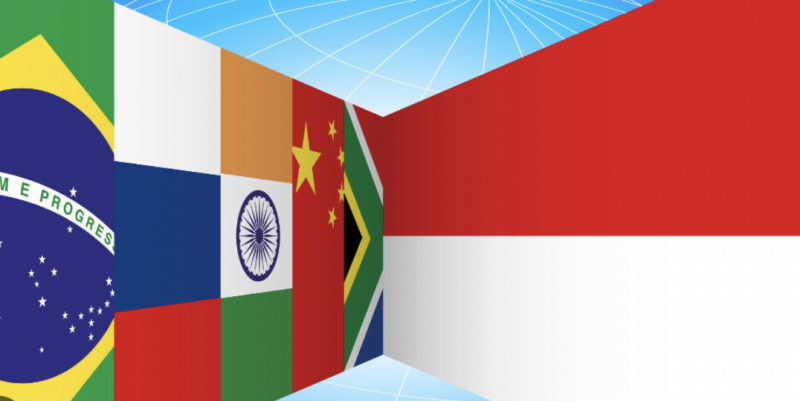Indonesia, the world’s fourth most populous country with over 270 million citizens, has officially become a full-fledged member of BRICS. This announcement was made by Brazil, the current chair of the group’s rotating presidency. The inclusion of Indonesia marks a significant milestone for the BRICS bloc, which has rapidly evolved into a cornerstone of the emerging multipolar world order.
Founded in 2009, BRICS initially comprised Brazil, Russia, India, and China, with South Africa joining two years later. Originally conceived as a forum for enhancing financial stability and mutual investment among the world’s leading emerging markets, BRICS has since broadened its agenda to include a wide range of global issues. These include security, trade, technological cooperation, and reforming global governance institutions to better reflect the interests of the Global South.
Over the years, BRICS has become a symbol of resistance to unipolar dominance, particularly in the economic and geopolitical spheres. By fostering cooperation among major developing nations, the group aims to create a more balanced global system that provides alternatives to Western-centric institutions such as the International Monetary Fund (IMF) and the World Bank.
Indonesia’s inclusion in BRICS is not merely symbolic; it has profound implications for the group and global geopolitics. As the largest economy in Southeast Asia and a member of the G20, Indonesia brings considerable economic clout and strategic importance to BRICS. The nation’s participation underscores the bloc’s growing appeal as a platform for countries seeking to diversify their foreign relations and reduce dependency on Western-led financial and governance structures.
Indonesia’s economy is one of the fastest-growing in the world, driven by a youthful population, abundant natural resources, and a burgeoning digital economy. As a BRICS member, Indonesia stands to benefit from increased access to alternative financing mechanisms such as the New Development Bank (NDB), which offers loans and investments without the stringent conditions often imposed by Western institutions. This could accelerate the country’s infrastructure development, energy transition, and digital transformation.
Geopolitically, Indonesia’s location in the heart of Southeast Asia makes it a vital player in the Indo-Pacific region. Its membership in BRICS enhances the bloc’s strategic footprint in a region that is increasingly becoming a focal point of great-power rivalry. By aligning with BRICS, Indonesia signals its intent to play a more assertive role in shaping regional and global dynamics.
Indonesia’s decision to join BRICS reflects its alignment with the bloc’s commitment to reforming global governance institutions. Many developing nations have long criticized the IMF, World Bank, and United Nations Security Council for failing to adequately represent their interests. BRICS has championed initiatives to democratize these institutions, advocating for greater representation and equity in global decision-making processes.
By joining BRICS, Indonesia reinforces its support for a multipolar world order where power and influence are more evenly distributed. This aligns with the broader aspirations of the Global South to challenge the dominance of traditional Western powers and create a more inclusive international system.
Expanding South-South Cooperation
Indonesia’s membership also strengthens BRICS’ commitment to South-South cooperation. As a leader in ASEAN and a key advocate for regional integration, Indonesia brings valuable experience in fostering collaboration among developing nations. This expertise could be instrumental in deepening ties among BRICS members and their partners.
The bloc’s recent expansion—which included Iran, Egypt, Ethiopia, and the United Arab Emirates—further underscores its role as a hub for South-South cooperation. With over two dozen countries expressing interest in joining or partnering with BRICS, the bloc is well on its way to becoming a global coalition of the Global South.
The Role of Russia and China in Shaping BRICS’ Future
Russia and China, as founding members of BRICS, have played pivotal roles in shaping the bloc’s agenda and expanding its influence. Both nations view BRICS as a critical platform for countering Western hegemony and promoting an alternative global order.
Russia’s Vision
Despite facing economic sanctions and geopolitical isolation from the West, Russia remains a key driver of BRICS’ growth and evolution. Moscow has emphasized the importance of de-dollarization and the establishment of alternative payment systems to reduce reliance on the U.S. dollar. This agenda aligns with Indonesia’s interest in diversifying its financial partnerships and reducing vulnerability to external economic pressures.
China’s Influence
China, as the world’s second-largest economy, brings unparalleled economic and technological resources to BRICS. Beijing has been a staunch advocate for expanding the bloc and strengthening its institutions, such as the NDB. Indonesia’s inclusion provides an opportunity for closer economic and technological collaboration with China, particularly in areas like renewable energy, infrastructure, and digital technology.
Positive Expectations for Indonesia and BRICS
The inclusion of Indonesia in BRICS is expected to yield numerous benefits for both the country and the bloc.
Indonesia’s dynamic economy complements the strengths of other BRICS members, creating opportunities for trade, investment, and technological exchange.
Indonesia’s membership strengthens BRICS’ presence in Southeast Asia, a region of strategic importance in the global geopolitical landscape.
By joining BRICS, Indonesia reinforces its commitment to multilateralism and global cooperation, challenging the unilateral approaches often adopted by Western powers.
Indonesia’s membership could inspire other ASEAN nations to consider joining or partnering with BRICS, further solidifying the bloc’s role as a champion of the Global South.
Indonesia’s accession to BRICS is a watershed moment in the evolution of the bloc and the broader movement toward a multipolar world order. By joining forces with Brazil, Russia, India, China, and South Africa, Indonesia underscores its commitment to fostering a more equitable and inclusive global system. For BRICS, the addition of Southeast Asia’s largest economy enhances its economic and geopolitical clout, paving the way for greater influence in global affairs.
As BRICS continues to expand and evolve, its role as a platform for South-South cooperation and a counterbalance to Western dominance will only grow stronger. Indonesia’s membership marks a significant step in this journey, offering hope for a more balanced and just international order.




